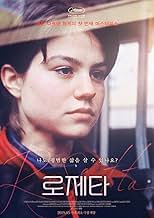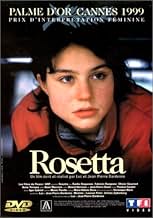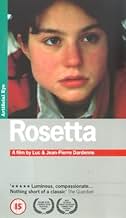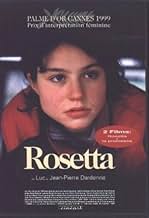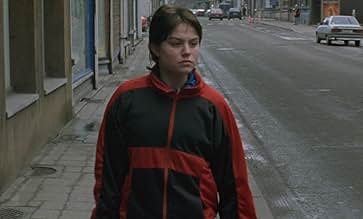VALUTAZIONE IMDb
7,4/10
16.552
LA TUA VALUTAZIONE
La giovane e impulsiva Rosetta vive con la madre alcolizzata. Spinta dalla disperazione, farà di tutto per mantenere un lavoro.La giovane e impulsiva Rosetta vive con la madre alcolizzata. Spinta dalla disperazione, farà di tutto per mantenere un lavoro.La giovane e impulsiva Rosetta vive con la madre alcolizzata. Spinta dalla disperazione, farà di tutto per mantenere un lavoro.
- Regia
- Sceneggiatura
- Star
- Premi
- 10 vittorie e 7 candidature totali
Leon Michaux
- First Policeman
- (as Léon Michaux)
Recensioni in evidenza
The Dardenne brothers were not incorrect when they called their Palme D'Or winning work "a war film.". It is an unremitting portrayal of the most dire hardships, centred around Rosetta (Emilie Dequenne), a young, spirited girl who battles with desperate tenacity to find a job and not so much escape as merely survive in her surroundings. Her life is a bleak struggle for subsistence in a world devoid of tenderness, in which her mother (Anne Yernaux), a quasi-prostitute more concerned with the source of her next drink than her daughter, stands as an example of the potential results of such continued deprivation. When she is befriended by a waffle vendor (Fabrizio Rongione), her prior existence leaves her unsure of how to act in the presence of an affectionate, concerned face, and when he attempts to teach her to dance, she can do no more than move jerkily without rhythm, uncomfortable in the arms of another human. The arisal of an opportunity to take his job forces Rosetta to confront whether physical necessity can ever be an excuse for the betrayal of others.
What follows is a superbly wrought piece of social realism, unsentimental in its examination of the dehumanising effects of poverty. For Rosetta and many others in analogous situations of the most dire physical hardship, their material deprivation leads to an erosion emotional and mental qualities. The Dardenne brothers' ruthless directional style, laced with close-ups and unpleasant details, tangibly conveys the dirt and drudgery of Rosetta's impoverished life. Indeed, the film is palpably cold, almost painfully explicit in its depiction of an uncaring world. In addition, Dardenne's performance, for which she won the Best Actress Award at Cannes, brings to life with understated excellence her fight, not to live well, but simply to survive by any means in a world that, for her, contains few hopes and no love.
The Dardenne brothers make no excuses or apologies for their presentation of Rosetta's base strivings, delivering a film that charts how far individuals can fall. Consistently raw and at times brutal, the film nevertheless proposes no answers, expects no sympathy, it merely conveys and evokes with a clear, uncompromising eye the bleak struggle for existence that is, for some, the total of what life has to offer. Harsh, but utterly compelling viewing.
What follows is a superbly wrought piece of social realism, unsentimental in its examination of the dehumanising effects of poverty. For Rosetta and many others in analogous situations of the most dire physical hardship, their material deprivation leads to an erosion emotional and mental qualities. The Dardenne brothers' ruthless directional style, laced with close-ups and unpleasant details, tangibly conveys the dirt and drudgery of Rosetta's impoverished life. Indeed, the film is palpably cold, almost painfully explicit in its depiction of an uncaring world. In addition, Dardenne's performance, for which she won the Best Actress Award at Cannes, brings to life with understated excellence her fight, not to live well, but simply to survive by any means in a world that, for her, contains few hopes and no love.
The Dardenne brothers make no excuses or apologies for their presentation of Rosetta's base strivings, delivering a film that charts how far individuals can fall. Consistently raw and at times brutal, the film nevertheless proposes no answers, expects no sympathy, it merely conveys and evokes with a clear, uncompromising eye the bleak struggle for existence that is, for some, the total of what life has to offer. Harsh, but utterly compelling viewing.
I saw "Rosetta" several weeks ago - and I still fail to recall any movie which could convey such an immediate sense of being pysically there, all the time along Rosetta's everydays' "war". We are bombarded and flooded with images 16hours per day, it takes great stregth of vision, of images, atmosphere and characters to grab at you this effectively in year 2000! Rosetta struck my as a very real encounter, with all the nonsense and ups / down of real events and life... It made me feel more of life, made me think of it more often and more intensely, it made me look into more eyes than I did before... Thank you, Luc and Jean-Pierre! and thank you, Emilie and all!
I found this film quite effecting without ever straying into crass sentimentality. Rosetta is a young girl who is full of anger and yearning. She lives with a dysfunctional alcoholic mother in a caravan park. Little is given about her past but we can understand that due to her upbringing she has limited options available to her. Her desire to be find a job (any job) is both desperate and touching. For Rosetta the prospect of a job, even a job that many in middle class society (indeed the average art house cinema goer!) might regard as mundane and without prospects, represents to her a chance to escape the existence on the outskirts of society. Her drive however raises her above the mere status of victim, and it is a credit to the lead that she conveys so much of this, without it having to be spelt out.
One thing I did find a little disconcerting was the wobbly camera technique, don't see if you are feeling a little nauseous as I was however this is only a minor criticism. Its around 90 minutes and I think well worth the investment if you like a good character based movie.
One thing I did find a little disconcerting was the wobbly camera technique, don't see if you are feeling a little nauseous as I was however this is only a minor criticism. Its around 90 minutes and I think well worth the investment if you like a good character based movie.
I saw Rosetta 3 or 4 months ago and it has stayed vividly in my mind. I would like to respond to two other commentaries here which compare Rosetta to earlier films.
One commentary compares it to Nights of Cabiria. But this is no pastoral fantasy like the Fellini. Another contributor calls Rosetta a fake Bresson. Presumably the point of comparison is with Bresson's Mouchette, and it's a good comparison to make, but I don't think it is one that diminishes Rosetta. Both Mouchette and Rosetta capture the flow of time and the characters' interior worlds realistically, but with realisms which are quite different. Mouchette's struggle is a spiritual one; Rosetta's struggle is with her physical conditions.
To make a comparison of my own, albeit an off-the-wall one, Rosetta's determination is strangely like the pure will-power that Lee Marvin demonstrates, barging into the Organisation's HQ in Point Blank. Maybe this forceful quality is what makes it a "war film".
The film-makers do the opposite of sentimentalising Rosetta's conditions as Fellini would have done. Arguably, they even go past Bresson, if you tend to a materialist rather than a religious point of view. They argue how poverty operates, how surviving it involves anger.
There is one moment when Rosetta slips in a lake and we understand exactly at the moment she does, that she may in fact drown. Not a moment that's easy to forget.
One commentary compares it to Nights of Cabiria. But this is no pastoral fantasy like the Fellini. Another contributor calls Rosetta a fake Bresson. Presumably the point of comparison is with Bresson's Mouchette, and it's a good comparison to make, but I don't think it is one that diminishes Rosetta. Both Mouchette and Rosetta capture the flow of time and the characters' interior worlds realistically, but with realisms which are quite different. Mouchette's struggle is a spiritual one; Rosetta's struggle is with her physical conditions.
To make a comparison of my own, albeit an off-the-wall one, Rosetta's determination is strangely like the pure will-power that Lee Marvin demonstrates, barging into the Organisation's HQ in Point Blank. Maybe this forceful quality is what makes it a "war film".
The film-makers do the opposite of sentimentalising Rosetta's conditions as Fellini would have done. Arguably, they even go past Bresson, if you tend to a materialist rather than a religious point of view. They argue how poverty operates, how surviving it involves anger.
There is one moment when Rosetta slips in a lake and we understand exactly at the moment she does, that she may in fact drown. Not a moment that's easy to forget.
Most movies try to make you feel good. Even in the most violent or despairing films the writers always provide some sort of relief, usually a character you can identify with. "Rosetta" doesn't not offer this kind of relief. It's not violent in the usual movie fashion, and it's not even as bleak or extreme or hopeless as many social films (after all, it's only the story of a teenage girl who is looking for work), it's just that there is no "this is just a movie after all" escapism. Rosetta is a brute force in motion, obsessive, relentless, and her horizon, made of concrete or muddy Belgian suburbs, is also the movie's horizon (the camera is always focused on her or on what she sees, most of the times in close-up). The war movie comparison is really accurate : "Rosetta" is shot like the first 20 minutes of "Saving Private Ryan" and she spends her time running, attacking, retreating, attacking again, followed by an omnipresent hand-held camera. At the same time, and in spite of (or because of) its reality, her character is also elliptical, hard to pity and you're not likely to love her as you can love Ken Loach's characters, for instance. This is where the movie is a tour-de-force and truly original, but obviously some viewers will have trouble to enter Rosetta's world.
Lo sapevi?
- QuizContrary to popular belief, the film did not inspire a new so-called "Rosetta Law" in Belgium that prohibited employers from paying teen workers less than the minimum wage and included other youth labour reforms. In a Guardian interview with the Dardenne brothers, Jean-Pierre explained the misconception: "No, that law already existed, it just hadn't been voted through yet. The truth is always less interesting than the fiction."
- BlooperWhen Rosetta is giving her mother money for a water bill she is wearing a jacket with the sleeves fully extended. However in the next immediate cut when she goes outside the sleeves are rolled up.
- Colonne sonoreSomething New
I più visti
Accedi per valutare e creare un elenco di titoli salvati per ottenere consigli personalizzati
- How long is Rosetta?Powered by Alexa
Dettagli
- Data di uscita
- Paesi di origine
- Sito ufficiale
- Lingua
- Celebre anche come
- Розетта
- Luoghi delle riprese
- Aziende produttrici
- Vedi altri crediti dell’azienda su IMDbPro
Botteghino
- Lordo Stati Uniti e Canada
- 266.665 USD
- Fine settimana di apertura Stati Uniti e Canada
- 20.187 USD
- 7 nov 1999
- Lordo in tutto il mondo
- 293.092 USD
Contribuisci a questa pagina
Suggerisci una modifica o aggiungi i contenuti mancanti

![Guarda Bande-annonce [OV]](https://m.media-amazon.com/images/M/MV5BOWY4MGMzYTItZjQwOS00MmVhLWE0MDYtMGZmYmFjNTkyYTU2XkEyXkFqcGdeQXRyYW5zY29kZS13b3JrZmxvdw@@._V1_QL75_UX500_CR0)


